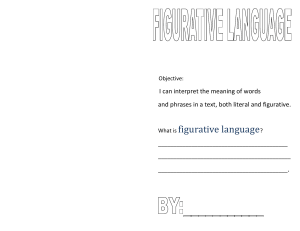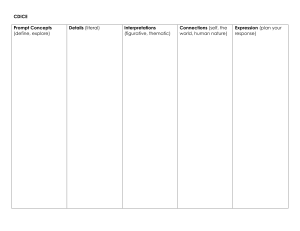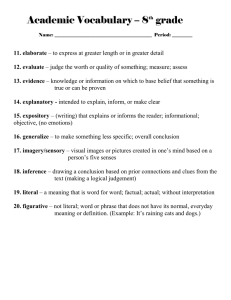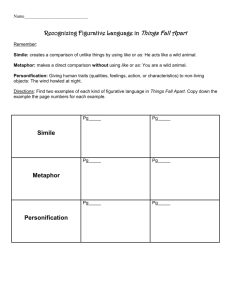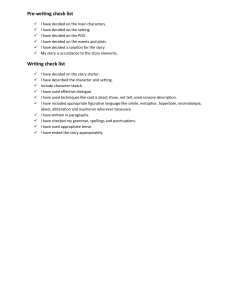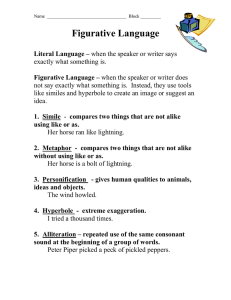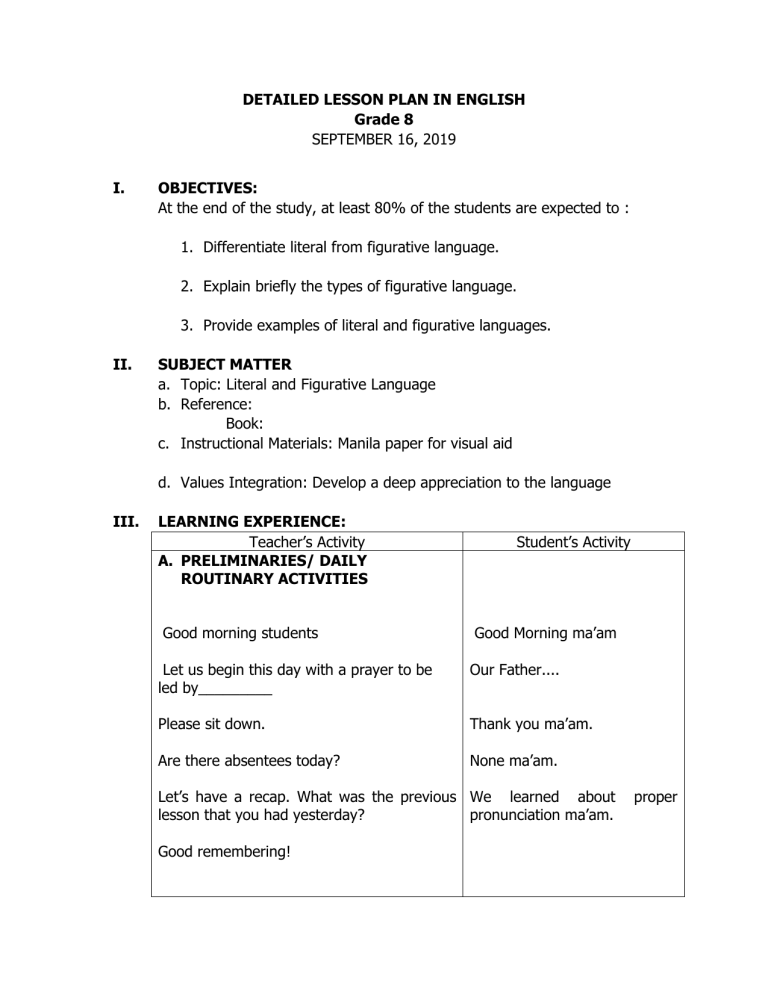
DETAILED LESSON PLAN IN ENGLISH Grade 8 SEPTEMBER 16, 2019 I. OBJECTIVES: At the end of the study, at least 80% of the students are expected to : 1. Differentiate literal from figurative language. 2. Explain briefly the types of figurative language. 3. Provide examples of literal and figurative languages. II. SUBJECT MATTER a. Topic: Literal and Figurative Language b. Reference: Book: c. Instructional Materials: Manila paper for visual aid d. Values Integration: Develop a deep appreciation to the language III. LEARNING EXPERIENCE: Teacher’s Activity A. PRELIMINARIES/ DAILY ROUTINARY ACTIVITIES Good morning students Student’s Activity Good Morning ma’am Let us begin this day with a prayer to be led by_________ Our Father.... Please sit down. Thank you ma’am. Are there absentees today? None ma’am. Let’s have a recap. What was the previous We learned about lesson that you had yesterday? pronunciation ma’am. Good remembering! proper B. MOTIVATION /CONDITIONING ACTIVITIES Please read the two sentences on the board. Yes ma’am. 1. Grasshoppers make a high pitched noise. 2. Grasshoppers are fiddlers who play their legs. Students, do both sentences mean the same? Yes, they do ma’am. If so, then what the difference among these two sentences? The first sentence is directly mentioned what the speaker wants to say. But the second sentence contains figurative speech. Perfect. The first sentence doesn’t contain any figurative language so it’s straight to the point. However the second sentence contains figurative language to beautify the sentence. Our topic today is Literal and Figurative Language. C. PRESENTATION OF THE TOPIC Based on the example above which one do I think, literal language is the you think is literal and which one is first sentence while the figurative language? figurative is second sentence ma’am. Correct. The first sentence is Literal language. Literal language means exactly what it says. It’s very straight forward to the point, so the reader/ listener do not have to extract meaning. In contrast, figurative language uses different figure of speech to make it more interesting and the message conveys more meaningful. Literal language uses in something that highly technical like building rockets. You’ll want to know exactly what the instruction says without any possible confusion. You can find literal language anywhere, from a book report to your favourite novel. Students, where do you think you can find Mostly in poem ma’am but text contain of figurative language? there is also in short story ma’am. Great answer. There are some types of figurative language. They are 1. Hyperbole, 2. Idiom, 3. Metaphor, 4. Personification, 5. Simile. In hyperbole, you exaggerated a sentence for emphasis purpose. Example; I can smell my mom’s cooking from miles away. I have tons of homework. Students can you give an example of I’ve seen this movie hyperbole? Yes please. thousand times, ma’am. for Fantastic. Next is Idiom. It’s an expression in which the intended meaning is different from literal meaning. Example; It’s raining cats and dogs. Who let the cat out of the bag Students can you give an example of idiom? A little bird told me, ma’am. Yes please. Another great answer. Next there is metaphor. It is direct comparison between to dissimilar things. Example: Her voice is music to my ear. Your mother is a saint. Students can you give an example of metaphor? Yes please. You are my knight in shining armour, ma’am. Good. Let’s proceed to personification. Its literary devices used to give human characteristic to nonhuman objects. Example; The palm trees were dancing in the wind. The wind sang a soothing song. Students can you give an example of Personification? Yes please. The carved pumpkin smiled at us, ma’am. Very good. Lastly we have simile. It’s a comparison between to unlike things by using “as” and “like”. Example; My sister is as noisy as bee. His blue eyes are like the ocean deep. Students can you give an example of simile? Yes please. The old man is as wise as an owl ma’am. Fantastic! You really make a good work. D. DISCUSSION Do you understand today’s lesson students? Yes, we do ma’am. If so, please explain the different between literal and figurative language. Literal language means that the message conveys is exact and straight to the point. It doesn’t use any figurative devices. While figurative language uses figurative devices and the reader/ audience should extract the meaning ma’am. Perfect answer. How many types of figurative devices are there? There are 5 types ma’am. Please mention what are those. Very good students. E. VALUES FORMATION (closing activity) F. GENERALIZATION They are hyperbole, idiom, metaphor, personification and simile ma’am. Very good participation, my dear students. Now who would like to say his/ her feeling about today’s lesson? I see. Thank you so much students, see you tomorrow IV. EVALUATION: 1. Give two example of each: a. Hyperbole b. Idiom c. Metaphor d. Personification e. Simile V. ASSIGNMENT/AGREEMENT: Describe your parents in a poem by using figurative language.
